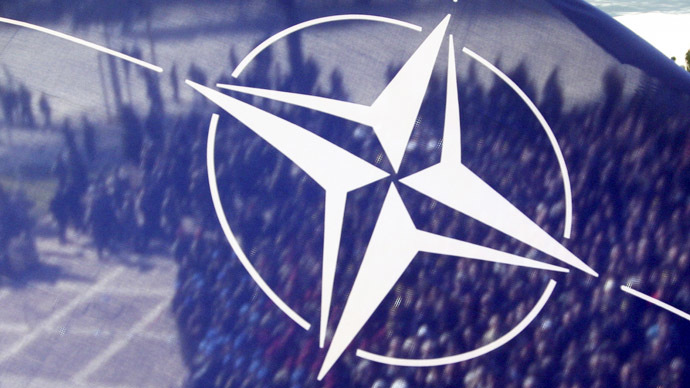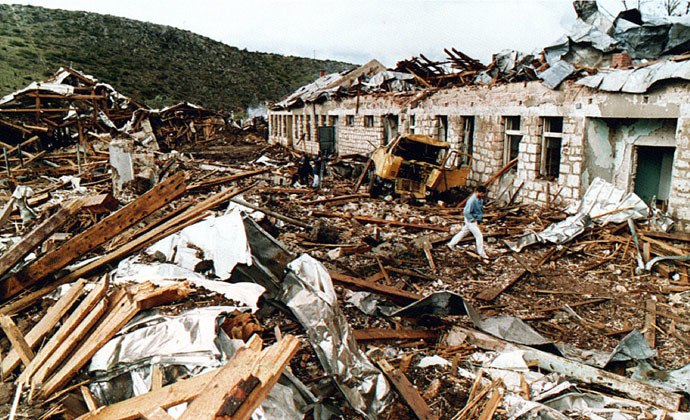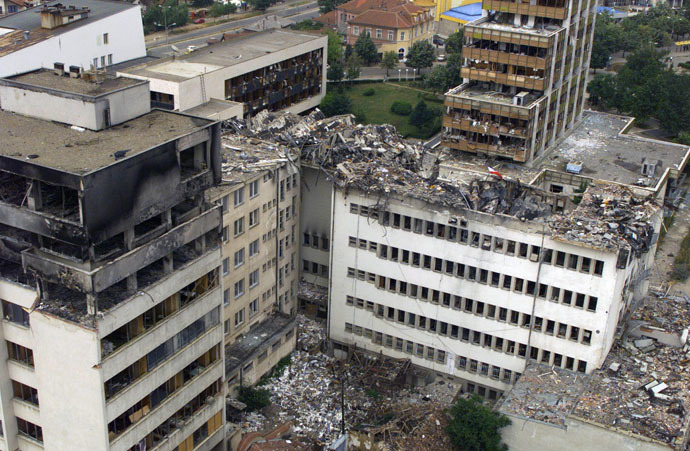NATO’s agenda hardly changed since Yugoslavia bombing

At the NATO summit in Wales this weekend two questions are being discussed and analyzed by those present: What to do about ISIS and what to do about Russia?
Aside from the preposterous relationship being drawn between a gang of medievalist killers with a penchant for cutting people’s heads off for daring to pray a certain way, and Europe’s most populous country with a history stretching back centuries, and a GDP of around $2.5 trillion, the sheer arrogance of an organization responsible for some of the most heinous acts of military aggression since the end of the Second World War attempting to seize the moral high ground when it comes to the rest of the world is breathtaking.
ISIS, for example, is a Frankenstein’s monster created by the US and its allies. It emerged from the chaos of a region scarred and disfigured by over a decade of war and the instability wrought by first the disastrous 2003 war on and occupation of Iraq, followed by the air war unleashed against Libya under the auspices of NATO in 2011.
And as for Russia vis-à-vis Ukraine, here we are talking about an attempt to expand NATO’s writ up to Russia’s western border, thus boxing in a country and people whose only crime is its refusal to bend the knee to US and Western domination.
To really understand the true nature of NATO, and the threat it poses to global peace and stability today, we come to the break-up of the former Yugoslavia as the moment when, seeking to justify its continued existence after the dissolution of the Warsaw Pact, NATO asserted its new role as enforcer of US/Western hegemony in the post-Soviet world – a neoliberal Murder Inc, if you like.
Under the rubric of ‘humanitarian intervention’ – code for imperialist aggression - NATO launched an air war against the remaining territory of the Socialist Federal Republic of Yugoslavia on 24 March 1999 without either the authorization of the United Nations or any basis in international law. Nineteen NATO member states took part in a bombing campaign lasting 78 days and involving 1000 aircraft operating from land bases in Germany and Italy, and the US aircraft carrier USS Theodore Roosevelt in the Adriatic. The Serbian Government estimated that 2,500 people were killed, with around 12,500 injured, while Serbia's infrastructure was decimated with schools, hospitals, airports, bridges, and other civilian targets attacked from the air by F17 and F16 military aircraft and with cruise missiles launched from ships.

The operation was initiated in response to Serbia's refusal to allow foreign troops on its territory on the basis of a decision taken at the Rambouillet Peace Conference in Paris which took place in February 1999. The conference had been organized to resolve the conflict between Serbia and the Kosovo Liberation Army (KLA), which led to the secession of Kosovo from Serbia and its eventual establishment as an independent state in 2008.
To understand the West's role in this conflict, the most brutal in Europe since the Second World War, it is important to understand something of the history of the Federal Republic of Yugoslavia and why its destruction was so important to the Western powers.
The six Balkan republics of Bosnia and Herzegovina, Croatia, Macedonia, Montenegro, Serbia, and Slovenia were brought together after the Second World War in 1945 to form the Socialist Federal Republic of Yugoslavia under the leadership of Josip Broz Tito, a Croat who led the communist partisans against the Nazi occupation of the Balkans and the old monarchist Kingdom of Yugoslavia.
Between 1960 and 1980 Yugoslavia enjoyed a period of sustained economic growth that funded its commitment to social and economic justice. Free health care and education was provided as a right for all its citizens regardless of ethnicity, as was the right to work, a living wage, affordable housing and utilities, while most of its economy came under state ownership.
As a founding member of the Non-Aligned Movement of nations that refused to be subsumed into either the Soviet or Western blocs during the Cold War, Yugoslavia had influence and prestige on the international stage. Tito was an astute and a respected leader committed to the principle of self-determination and to the forging of alliances with the world's developing nations for mutual advancement.
Yet despite Tito's refusal to be subsumed into the Soviet bloc, Yugoslavia remained safe from capitalist penetration while the Soviet Union existed as a countervailing force to US-led imperialism. As soon as the Soviet Union dissolved, however, this protective cloak was removed and the die was cast.
Fuelling the economic growth enjoyed by Yugoslavia during the '60s and '70s was its decision to borrow heavily from the West in order to invest in industry and the production of both export and consumer goods. This proved a disastrous course, as it rendered Yugoslavia's economy vulnerable to the fluctuations of global markets. As a result of the world recession of the 1970s, export markets contracted with the result that Yugoslavia's export production dried up along with its ability to service its debts. In response, the IMF demanded a restructuring of Yugoslavia’s economy to prioritize debt repayment. Stuck between the hammer of indebtedness and the anvil of continued borrowing in order to subsidize its commitment to the provision of education, health care, housing and social security for its citizens, by the late 1980s the Yugoslav economy was in free fall.
With the collapse of the Soviet Union, central banks moved in at the behest of policymakers in Washington, London and Bonn. Determined to break up the last socialist country in Europe, they threatened to institute an economic blockade unless the Yugoslav government agreed to hold separate elections in each of its six republics. The passing of the US Foreign Operations Appropriations law 101-513 in 1991 contained a section relating specifically to Yugoslavia, stipulating that all loans, aid and credits would be cut off within six months unless elections were held.
Given the extent of US control over the IMF and the World Bank, this legislation was a de facto death sentence for the Yugoslav Federal Republic.
The most devastating provision of the law stipulated that only the forces within Yugoslavia deemed democratic by Washington would now receive loans from the US. Various right-wing factions in each of the six republics benefited directly from this provision and became the recipients of US largesse. It was a measure designed to bring to the fore and exacerbate differences along ethnic lines throughout the six republics that made up Yugoslavia. In a climate of economic hardship, it was a measure which proved successful.
Germany recognized the secession of Croatia from the Federal Republic of Yugoslavia in 1991. Civil war ensued. It lasted eight years until NATO’s three month air war waged against the recalcitrant Serbs, who refused from the outset to toe the line and acquiesce in the break-up of the federal republic, brought it to an end.
Led by Slobodan Milosevic, the Serbian people were demonized for their refusal to bend the knee, with accusations of genocide and Nazi-like atrocities leveled against their military forces and against their government. It should be noted that during the Second World War more Serbs were killed per capita than any other ethnic group resisting the Nazis.

After NATO’s campaign came to an end, Milosevic was arrested and charged with war crimes and genocide. As in any war, and certainly in fratricidal civil wars, atrocities are committed by all sides involved. Certainly, Serbian military forces did commit war crimes, most notably with the siege of Sarajevo and the massacre of Srebrenica in 1995, and it was right that those responsible were held to account. However the Serbian people found themselves on the losing side and as such at the sharp end of “victors' justice” relative to the justice received by various other factions and military forces involved in the fighting, particularly the KLA.
During Milosevic's trial in The Hague evidence of genocide against his government was never produced. This was despite the scouring of the countryside and towns and villages by international investigators searching for evidence in the form of mass graves and witnesses willing and able to corroborate such allegations. Prior to his premature death, which remains shrouded in mystery, Milosevic had managed to turn proceedings in the International Criminal Court into a trial of his accusers, successfully exposing their role and culpability in the break-up of his country.
As for the former Yugoslavia, with its collapse came the inevitable shock therapy in the form of the privatization of all public services, utilities and state-run industries and, like a pack of rabid and hungry dogs around a carcass, the arrival of global corporations.
As night follows day, this resulted in severe economic hardship and the scourge of unemployment, which led directly to the dislocation of communities, mass migration to the West and the emergence and rise of criminal gangs involved in people trafficking, the sex and drugs trades, and other crimes across Europe.
In a world in which international law and justice actually stood for something, NATO would not be holding a lavish summit to discuss the problems of the world. Instead, the world would be holding a summit to discuss the problem of NATO.
The statements, views and opinions expressed in this column are solely those of the author and do not necessarily represent those of RT.
The statements, views and opinions expressed in this column are solely those of the author and do not necessarily represent those of RT.













